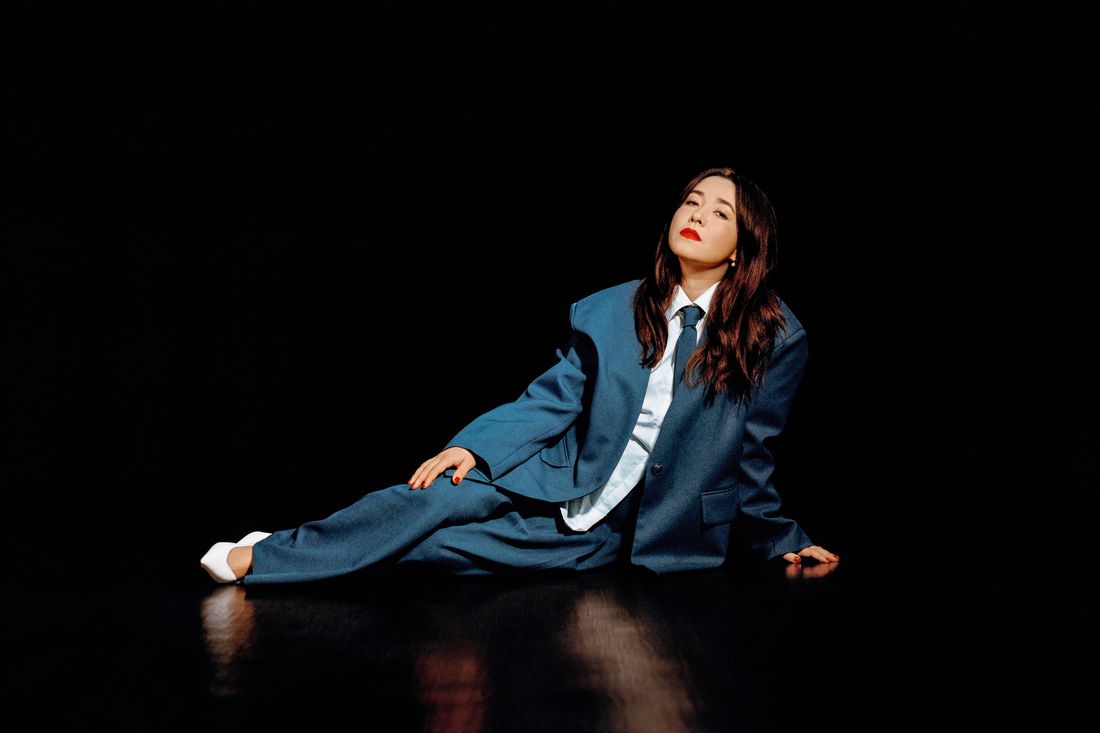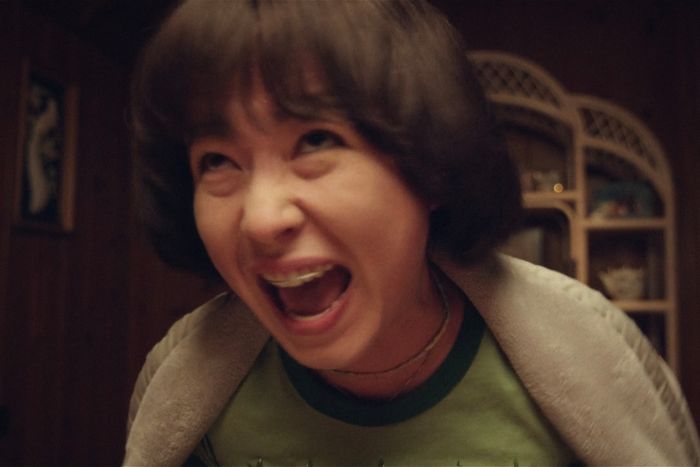
This interview was published on April 17, 2024. Mr. & Mrs. Smith has since received 16 nominations for the 2024 Emmy Awards, including an Outstanding Lead Actress nod for Maya Erskine. Read all of Vulture’s Emmy-race coverage here.
By whatever standard you might succeed at British afternoon tea, Maya Erskine and I seem to be failing. We’re in a large white-walled room at the Langham hotel in London, which claims to be the birthplace of the meal and feels like being inside a wedding cake, with elaborate silver place settings and cream-colored banquettes. The clientele consists of the quietly posh and, like us, the obviously tourist. The service itself is meticulous and overwhelming: You choose your tea and then get finger sandwiches and scones (savory), followed by a dessert course with a list of treats that reads like a menu from a Redwall book — one is a “walnut whip pastry with walnut marshmallow, walnut cream, walnut sablée, and a bit of dark chocolate,” our waitress tells us in a whirl of wh sounds — as well as a selection of scones (sweet). It all requires more attentiveness than Erskine currently possesses. She has just flown in from L.A. and hardly slept the night before. She had a giant late breakfast that included blood sausage, which delighted her — “the meat here tastes very meaty,” she raves, while apologizing for her current lack of appetite.
Erskine is in town for the U.K. premiere of her new TV series, Mr. & Mrs. Smith, in which she plays one-half of a couple that tends to bumble through its superspy assignments. The series is based on the high-gloss 2005 Doug Liman movie starring Brad Pitt and Angelina Jolie, but it spikes that concept with awkward, human-scale cringe comedy. Erskine’s Jane Smith and her partner, John, the show’s co-creator Donald Glover, are like C-minus students in an AP class, as director Hiro Murai and Francesca Sloane, the show’s other co-creator, described them to Erskine. After failing separately at other ambitions, they pair up on a gig working for a mysterious corporation that sends them on missions to places like Lake Como and gifts them a truly enviable New York brownstone decked out with everything from expensive art to a high-end “water bar” (a kind of seltzer machine invented for the show). The two tend to make it through by the skin of their teeth. They miscommunicate, they’re almost always out of breath, they don’t actually know how to ski — that last part is true of Glover’s character but also of Erskine herself. Filming on location in the Dolomites, she hit her head on the slopes but was quickly dismissed from an Italian hospital after being told she had only a minor injury.
As Jane and John stumble through their missions, they speedrun the steps of a typical millennial relationship. The episodes are structured around recognizable milestones: A first assignment, during which Jane and John chat at a café and then tail a target to a play, resembles a first date; elsewhere, they try to impress another cool spy couple they meet at a farmers’ market; and a late episode involves the ordeal of couples therapy (with a hilariously granola Sarah Paulson). Glover’s work, as in Atlanta or Swarm, can tend toward opaque anti-comedy, but Mr. & Mrs. Smith is much more direct and crowd-pleasing, like Master of None with espionage. He pitched it to Erskine as a spy version of Ingmar Bergman’s Scenes From a Marriage; that series, however, doesn’t have nearly as many jokes about bodily functions. Erskine enjoys telling people about the comedic beat in which Jane farts in front of John for the first time. “I have to find another moment,” she says, laughing. “But these are things that are inevitable in a relationship, or I would hope so.”
Erskine’s breakout show, PEN15, was filled with moments like that: farts, period blood, the joyous, terrifying world of masturbation. Erskine co-created and starred in it with her friend and former NYU classmate Anna Konkle, playing versions of themselves as best friends in middle school with braces, terrible early-aughts fashion, and, in Erskine’s case, a bowl cut, surrounded by a supporting cast of actually young actors. It was an audacious live-wire concept, full of bits of semi-autobiographical trauma. Erskine’s character, also named Maya, was particularly off the wall, manic with hormones and prone to bursts of intense feeling. In the pilot, a crush calls her ugly and she lashes out by yelling, “You’ve got an aardvark dick, and that’s why your dad died!” So those who recognize Erskine’s work tend to be familiar with her at her most unhinged. Recently, a scene in which her character tries to get attention at the dinner table by singing jazz with a retainer on had a burst of popularity. “There have been younger people stopping me, being like, ‘You’re on TikTok right now. You’re scatting,’ ” she tells me. “But it still always feels like I’m a tiny person making my work in a little corner of the world.”
PEN15 was enough to get Erskine noticed by the creators of Mr. & Mrs. Smith. In the summer of 2021, the series was midway through a complicated development process. Earlier that year, it was announced, via a viral meme video, as a vehicle for Glover and Phoebe Waller-Bridge, who had signed a deal with Amazon hot off the success of Fleabag. They had co-created the show alongside Sloane, who was a writer for Atlanta. But seven months in, Waller-Bridge left, citing creative differences, which meant the show needed a new Jane Smith. “The first name that popped into my head was Maya,” Sloane tells me. “Then I asked Hiro Murai, and he said ‘Maya.’ And I asked my sister, and my sister said ‘Maya.’ ” Sloane could imagine Erskine as an authentic partner to Glover, as well as someone who would play an outcast in a way that suited the character. She thought, “Let’s get this incredible actor out of the bowl-cut wig and show the world what she can do.”
At the time, Erskine was four months out from the birth of her son and in the process of finishing postproduction work on the final episodes of PEN15. Sloane and Glover had already sketched out their plans for the series, but knowing Erskine was an actress who had written her own material, they gave her room to shape Jane. “I sent a document — and I don’t know if they asked for a document — of many pages just sharing personal anecdotes and relationship stories,” she says. According to Sloane, the character came into focus with Erskine onboard. The creators had been developing a version of Jane with Waller-Bridge that had some resemblance to Erskine’s part — an early dynamic that survives is that John acts like a golden retriever and Jane like a coy cat — but they hadn’t been able to crack her. “All the idiosyncrasies Jane has got loudest once I saw Maya in the role,” Sloane says.
Where PEN15 had introduced Erskine as a gonzo, Jim Carrey–esque comedic talent, Mr. & Mrs. Smith makes a convincing case for her as a romantic lead. Her version of Jane maneuvers through the world tactically, ready to be hurt. In preparing for the role, Erskine says, she thought about Sigourney Weaver in Alien, “just because she’s so incredibly strong in that, and she’s someone who has to hide her fear and the emotions that she’s going through, but you can see it in her eyes.” Once Glover, himself playing a warmer version of his typical persona, gets her to let her guard down, she turns into a goofball. Their spats can be delightfully petty — Erskine furrows her whole face as if she’s kneading dough when Jane is mad at John for not texting her back. Erskine has already starred in one rom-com, opposite Jack Quaid in the underseen 2019 indie Plus One, but this show will convince you that people should write many more for her.
In doing press for Mr. & Mrs. Smith, Erskine has run into one specific tic. During interviews for PEN15, she was always paired with Konkle. Now, she’s answering questions all on her own — sometimes even over a tea service while a piano player clinks through covers of Adele and Whitney Houston on the other side of the room. “Sorry, the piano is, like, in my head,” Erskine says mid-sentence. She realizes she has fallen into a habit of not finishing her own thoughts. “My brother points it out,” she says. She thinks it comes from the experience of having a lot of close friends and collaborators she can communicate with in shorthand. For Plus One, she worked with writer-directors Jeff Chan and Andrew Rhymer, friends from her days at NYU; she met her husband, Michael Angarano, in talking with him about a role in a film he was directing (the yet-to-be-released Sacramento, starring himself and Michael Cera) and then incorporated him into the cast of PEN15. “I’m so used to starting the sentence and then looking to the other person like, You know?” She pauses just long enough for me to consider interrupting. “And then they’re like, ‘What did you just say?’ ”
Erskine enjoys the intimacy of working with friends but admits it can be emotionally intense. The experience of making PEN15 was grueling. She and Konkle were heavily involved in writing, filming, and postproduction. “We gave it our all,” Erskine says. “We didn’t know how to be like, ‘Oh, it’s five o’clock — let’s go home.’ It was like, ‘We will be here until midnight.’ That’s not sustainable for very long.” They decided to wrap up PEN15 after two seasons. They’ve gone their separate ways creatively for the moment but remain close friends. “We talk to each other all the time about work we’re doing on our own and get each other’s opinions,” Erskine says. “In the future, I’d love to produce something she’s making. I want to champion her. I think that’s my happy place.”
PEN15 was also a product of a different era in streaming television, when producers were willing to take a chance on risky projects and let creators run wild. Erskine is not currently interested in returning to the exhausting, triple-hyphenate experience of writing, directing, and acting. Right now, she’s “nesting” in a new home with her family in the San Fernando Valley. “Especially being a parent,” she says, “I don’t know if I have the energy to do that.” She’s okay with two out of three, though: She just turned in a draft of an HBO series based on Leïla Slimani’s book The Perfect Nanny, in which, if it’s green-lit, Erskine would star across from Nicole Kidman, whose producing clout is helping get it made. (Fittingly, another of Erskine’s friends, a former classmate who became a development executive, first suggested she try to adapt it.) “I thrive on bouncing off of other people, so it feels somewhat solitary and lonely,” she says of writing solo. “It felt a bit challenging for me, but a good challenge.” Written in French, the novel is about a Moroccan-born mother who hires a seemingly kindly older white nanny who kills her two children. Erskine has been thinking intently about what an adaptation owes to the original material — she compares her work on this to the film version of Notes on a Scandal, which does its own riff on a novel — as well as to actual true-crime events, like the 2012 murders in New York that inspired the book. “I hated the idea of profiting off something so horrific, even if it’s not directly based on it,” she says. “The way I’m trying to get into it is that it’s not that at all. It’s about the codependent working relationship between these two women and the complex dynamics that arise between a nanny and a mother.”
Erskine looks at the oversaturated world of TV with more trepidation these days — once you release a show into the ether, it could well disappear. “So many people are getting to share stories, but you want to make sure those stories are being watched, too,” she says. She’s fretful about how her work is perceived. When you make something, you don’t think about how it’s going to be received and then suddenly you’re confronted with its existence, she explains: “It’s like going out and drinking all night and then you’re like, What did I say? Why did I make that choice?” Even though the original Mr. & Mrs. Smith isn’t exactly a tentpole franchise, it’s familiar enough for some to be mad at the series already, prerelease, for not fulfilling their expectations. Glover, whose work regularly invites internet discourse, has been helpful in teaching Erskine to be okay with upsetting people, though she is learning to develop a thicker skin. Sloane tells me that when working on Mr. & Mrs. Smith, she could give Erskine ten compliments, but the actress would zero in on the one minor, not-so-positive note. “I’ve scanned some YouTube comments,” Erskine says ruefully, pointing out that, yes, some of the reactions to her and Glover taking over roles played by white actors have been racist. She has already found a creative response to the predicament. “I want to play an internet troll,” she says, munching on a scone with clotted cream and pondering the idea. “Someone who is sitting in his room — I’m saying his — typing up comments. He lives at his mom’s house.” I suggest the troll played by Maya Erskine could specifically be mad at Maya Erskine the actress. That feels like something in her wheelhouse — a performance that circles back with an awareness of itself.




